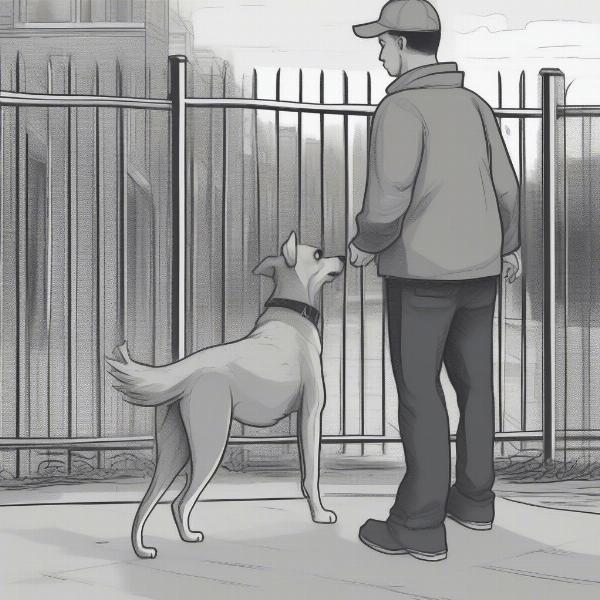Understanding why your dog barks at strangers is crucial for both your peace of mind and your dog’s well-being. Barking is a natural canine communication method, but excessive barking at strangers can be disruptive and indicate underlying issues. This article will delve into the common reasons behind this behavior and provide practical solutions to help you manage it effectively.
Decoding the Bark: Reasons Why Your Dog Barks at Strangers
Several factors contribute to a dog’s tendency to bark at unfamiliar faces. These range from protective instincts to fear and territoriality. Identifying the root cause is the first step towards addressing the issue.
- Territoriality: Dogs often perceive their home and surrounding area as their territory. Barking at strangers approaching their perceived domain is a way of warning the “intruder” and asserting dominance.
- Fear and Anxiety: A dog who is fearful or anxious may bark at strangers as a defense mechanism. This is especially common in dogs who have had negative experiences with unfamiliar people or lack proper socialization.
- Protective Instincts: Some dogs have a strong protective instinct towards their family and may bark at strangers to alert them of potential danger or perceived threats.
- Lack of Socialization: Dogs who haven’t been exposed to a variety of people, places, and sounds during their critical developmental period may be more likely to bark at strangers due to unfamiliarity and fear.
- Excitement and Alerting: Sometimes, barking at strangers can simply be a way for your dog to express excitement or alert you to the presence of someone new.
 Dog barking at a stranger
Dog barking at a stranger
Is Your Dog’s Barking a Problem? Identifying Excessive Barking
Not all barking at strangers is problematic. A short, controlled bark can be a normal response. However, excessive, prolonged barking, coupled with other signs of distress like lunging, growling, or raised hackles, indicates a behavioral issue that needs attention.
How to Tell if Your Dog’s Barking is Excessive
- Duration: Does the barking continue long after the stranger has passed?
- Intensity: Is the bark high-pitched and frantic, suggesting fear or aggression?
- Body Language: Does your dog display other signs of aggression or anxiety, such as bared teeth, a stiff posture, or tucked tail?
- Context: Does your dog bark at strangers in various situations, or only in specific contexts, such as when they approach your home?
How to Stop Your Dog from Barking at Strangers
Addressing excessive barking requires a multi-pronged approach combining training, behavior modification, and management techniques. Consistency and patience are key to achieving lasting results.
- Socialization: Early and ongoing socialization is crucial. Expose your dog to a variety of people, places, and situations in a positive and controlled manner.
- Positive Reinforcement Training: Reward your dog for calm behavior around strangers. Use treats, praise, and toys to reinforce desired responses.
- Desensitization and Counter-Conditioning: Gradually expose your dog to strangers at a safe distance, rewarding calm behavior. Slowly decrease the distance as your dog becomes more comfortable.
- “Quiet” Command: Teach your dog a “quiet” command. When your dog starts barking, say “quiet” firmly and reward them when they stop.
- Distraction Techniques: Redirect your dog’s attention with a toy or a command when they see a stranger.
- Management Strategies: Manage your dog’s environment to minimize exposure to triggers. Use blinds or curtains to block their view of the street, or walk them during off-peak hours.
When to Seek Professional Help
If your dog’s barking persists despite your efforts, consult a certified dog trainer or a veterinary behaviorist. They can assess your dog’s behavior, identify underlying issues, and develop a tailored training plan.
Conclusion
Addressing your dog’s barking at strangers requires understanding the underlying causes and implementing appropriate training and management strategies. With patience, consistency, and the right approach, you can help your dog become more comfortable and confident around unfamiliar faces, creating a more harmonious environment for both of you. Remember that professional help is available if needed.
FAQ
- Why does my dog bark at some strangers but not others? Your dog may react differently based on the stranger’s body language, demeanor, or even their scent.
- Is it ever okay for my dog to bark at strangers? A brief, controlled bark can be a normal alert response. Excessive barking is the issue.
- Can an older dog learn to stop barking at strangers? Yes, older dogs can learn new behaviors. Patience and consistent training are essential.
- Are certain breeds more prone to barking at strangers? Some breeds are naturally more protective or alert, but any dog can develop this behavior.
- What should I do if my dog barks aggressively at strangers? Consult a professional dog trainer or behaviorist for guidance on managing aggressive behavior.
- Can medication help with excessive barking? In some cases, medication may be prescribed in conjunction with behavior modification techniques, but it’s essential to consult a veterinarian.
- How can I prevent my dog from developing this behavior in the first place? Early socialization and positive reinforcement training are key to preventing excessive barking at strangers.
Related Articles
- why is my dog calm around me but not others
- how to stop your dog from barking at strangers
- dog reactivity classes
ILM Dog is a leading international online resource for dog owners, offering expert advice on all aspects of canine care, from breed selection and puppy care to health, training, nutrition, and more. We are dedicated to providing practical, reliable information to help you build a stronger bond with your furry friend. Whether you’re a seasoned dog owner or just starting your journey, ILM Dog is here to support you every step of the way. For personalized advice on dog training and behavior, contact us at [email protected] or call us at +44 20-3965-8624.